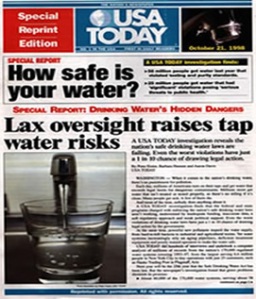 Concern about possible contaminants in drinking water — reinforced by the aging of most municipal water systems — has led to a sharp rise in sales of bottled drinking water. However, Good Housekeeping magazine estimates that filtering water at home can save about $200 a year compared with buying bottled water, even taking into account the cost of replacement filters. Both Brita and PUR, two of the leading water-filter brands, say their water-filter pitchers contain no bisphenol A (BPA) — a chemical that’s still in some plastic water bottles. Water filters are also much better for the environment than disposable plastic bottles, and now Brita is starting to recycle the disposable filters from its popular pitchers.
Concern about possible contaminants in drinking water — reinforced by the aging of most municipal water systems — has led to a sharp rise in sales of bottled drinking water. However, Good Housekeeping magazine estimates that filtering water at home can save about $200 a year compared with buying bottled water, even taking into account the cost of replacement filters. Both Brita and PUR, two of the leading water-filter brands, say their water-filter pitchers contain no bisphenol A (BPA) — a chemical that’s still in some plastic water bottles. Water filters are also much better for the environment than disposable plastic bottles, and now Brita is starting to recycle the disposable filters from its popular pitchers.
Reviews of water filters cover three basic factors: filtering effectiveness, water taste and ease of use. Comparison tests at Consumer Reports and Good Housekeeping cover all three factors, but with different emphases. Consumer Reports tests more types and models, but relies on lab tests for lead and chloroform to indicate overall filtering effectiveness. Overall ratings there emphasize flow rate and ease of use more than at Good Housekeeping, whose editors say filtering out the most contaminants is more important than cost or convenience. Good Housekeeping tests for 13 contaminants, but only covers faucet-mount and pitcher water filters. A detailed lab study published at Water Technology Online tests water filters for one of the most difficult contaminants to filter out, perfluorochemicals (PFCs), the chemicals used to make Teflon and Gore-Tex.
Experts recommend relying on lab tests by the National Sanitation Foundation (NSF), which certifies specific water filters and tells exactly which contaminants they reduce, and by how much. An excellent review on National Geographic‘s Green Guide website summarizes the NSF ratings for some of the most popular water filters, but you can check the NSF database before buying any water filter. The key, say experts, is to have your tap water tested before you buy a filter, so you’ll be choosing a water filter that fits your exact needs. You may find out that you don’t need a water filter at all — unless you just don’t like the taste of your tap water.
Many people don’t like the taste of chlorine, and shower water filters — which filter chlorine out — are also becoming popular since chlorine can affect skin and hair. We found quite a few articles pointing out that you can absorb water contaminants through the skin just as you can from drinking. We found some informal comparisons and owner-written reviews of shower water filters, but no official agency tests, rates or regulates them.
Reviews note that while the best pitcher, dispenser and faucet-mount water filters can handle the most common water contaminants in tap water, the sediment found in some water can clog them so quickly that they’re virtually unusable. Whole-house water filters are better for filtering out sediment and rust, but not for lead, bad tastes or many other contaminants, so you may still need a point-of-use water filter for those.
![Reblog this post [with Zemanta]](https://i0.wp.com/img.zemanta.com/reblog_e.png)